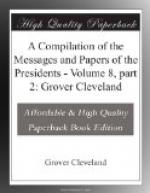Approved, and the Secretary of State will transmit the order to marshals, the Lieutenant-General, and Secretary of the Interior.
ABRAHAM LINCOLN.
AUGUST 7, 1861.
By the fifty-seventh article of the act of Congress entitled “An act for establishing rules and articles for the government of the armies of the United States,” approved April 10, 1806, holding correspondence with or giving intelligence to the enemy, either directly or indirectly, is made punishable by death, or such other punishment as shall be ordered by the sentence of a court-martial. Public safety requires strict enforcement of this article.
It is therefore ordered, That all correspondence and communication, verbally or by writing, printing, or telegraphing, respecting operations of the Army or military movements on land or water, or respecting the troops, camps, arsenals, intrenchments, or military affairs within the several military districts, by which intelligence shall be, directly or indirectly, given to the enemy, without the authority and sanction of the major-general in command, be, and the same are, absolutely prohibited, and from and after the date of this order persons violating the same will be proceeded against under the fifty-seventh article of war.
SIMON CAMERON.
Approved:
A. LINCOLN.
GENERAL ORDER.
EXECUTIVE OF THE UNITED STATES, October 4, 1861
Flag-officers of the United States Navy authorized to wear a square flag at the mizzenmast head will take rank with major-generals of the United States Army.
ABRAHAM LINCOLN.
WASHINGTON, October 14, 1861.
Lieutenant-General WINFIELD SCOTT:
The military line of the United States for the suppression of the insurrection may be extended so far as Bangor, in Maine. You and any officer acting under your authority are hereby authorized to suspend the writ of habeas corpus in any place between that place and the city of Washington.
ABRAHAM LINCOLN.
By the President:
WILLIAM H. SEWARD,
Secretary of State.
GENERAL ORDERS, NO. 94.
WAR DEPARTMENT,
ADJUTANT-GENERAL’S OFFICE,
Washington, November 1, 1861.
The following order from the President of the United States, announcing the retirement from active command of the honored veteran Lieutenant-General Winfield Scott, will be read by the Army with profound regret:
EXECUTIVE MANSION,
Washington, November 1, 1861.
On the 1st day of November, A.D. 1861, upon his own application to the President of the United States, Brevet Lieutenant-General Winfield Scott is ordered to be placed, and hereby is placed, upon the list of retired officers of the Army of the United States, without reduction in his current pay, subsistence, or allowances.




